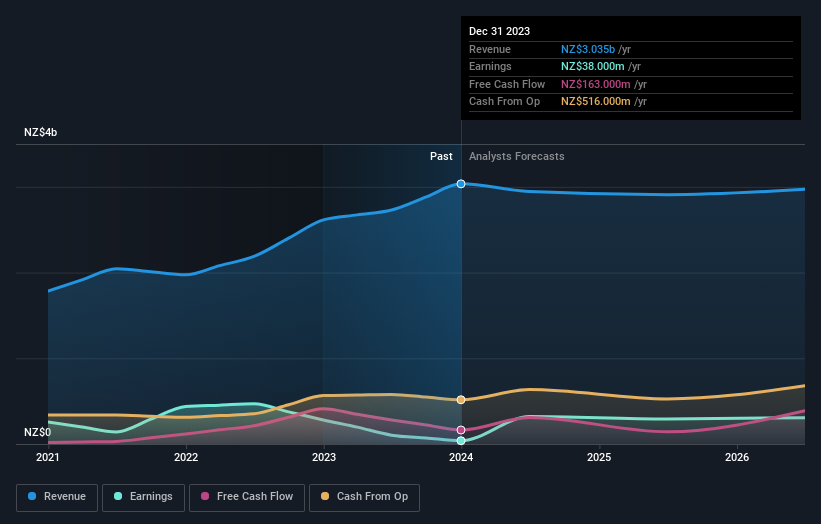Stock Analysis
- New Zealand
- /
- Electric Utilities
- /
- NZSE:MCY
Sovereign wealth funds account for 51% of Mercury NZ Limited's (NZSE:MCY) ownership, while individual investors account for 34%

Key Insights
- The considerable ownership by sovereign wealth funds in Mercury NZ indicates that they collectively have a greater say in management and business strategy
- 51% of the company is held by a single shareholder (New Zealand Superannuation Fund)
- 15% of Mercury NZ is held by Institutions
To get a sense of who is truly in control of Mercury NZ Limited (NZSE:MCY), it is important to understand the ownership structure of the business. With 51% stake, sovereign wealth funds possess the maximum shares in the company. Put another way, the group faces the maximum upside potential (or downside risk).
Individual investors, on the other hand, account for 34% of the company's stockholders.
In the chart below, we zoom in on the different ownership groups of Mercury NZ.
View our latest analysis for Mercury NZ

What Does The Institutional Ownership Tell Us About Mercury NZ?
Institutional investors commonly compare their own returns to the returns of a commonly followed index. So they generally do consider buying larger companies that are included in the relevant benchmark index.
We can see that Mercury NZ does have institutional investors; and they hold a good portion of the company's stock. This suggests some credibility amongst professional investors. But we can't rely on that fact alone since institutions make bad investments sometimes, just like everyone does. It is not uncommon to see a big share price drop if two large institutional investors try to sell out of a stock at the same time. So it is worth checking the past earnings trajectory of Mercury NZ, (below). Of course, keep in mind that there are other factors to consider, too.

Mercury NZ is not owned by hedge funds. The company's largest shareholder is New Zealand Superannuation Fund, with ownership of 51%. This implies that they have majority interest control of the future of the company. In comparison, the second and third largest shareholders hold about 3.2% and 1.9% of the stock.
While it makes sense to study institutional ownership data for a company, it also makes sense to study analyst sentiments to know which way the wind is blowing. There are plenty of analysts covering the stock, so it might be worth seeing what they are forecasting, too.
Insider Ownership Of Mercury NZ
The definition of an insider can differ slightly between different countries, but members of the board of directors always count. Company management run the business, but the CEO will answer to the board, even if he or she is a member of it.
Insider ownership is positive when it signals leadership are thinking like the true owners of the company. However, high insider ownership can also give immense power to a small group within the company. This can be negative in some circumstances.
Our most recent data indicates that insiders own less than 1% of Mercury NZ Limited. Keep in mind that it's a big company, and the insiders own NZ$5.4m worth of shares. The absolute value might be more important than the proportional share. It is good to see board members owning shares, but it might be worth checking if those insiders have been buying.
General Public Ownership
The general public, who are usually individual investors, hold a 34% stake in Mercury NZ. While this group can't necessarily call the shots, it can certainly have a real influence on how the company is run.
Next Steps:
I find it very interesting to look at who exactly owns a company. But to truly gain insight, we need to consider other information, too. Consider for instance, the ever-present spectre of investment risk. We've identified 4 warning signs with Mercury NZ (at least 1 which is significant) , and understanding them should be part of your investment process.
Ultimately the future is most important. You can access this free report on analyst forecasts for the company.
NB: Figures in this article are calculated using data from the last twelve months, which refer to the 12-month period ending on the last date of the month the financial statement is dated. This may not be consistent with full year annual report figures.
Valuation is complex, but we're helping make it simple.
Find out whether Mercury NZ is potentially over or undervalued by checking out our comprehensive analysis, which includes fair value estimates, risks and warnings, dividends, insider transactions and financial health.
View the Free AnalysisHave feedback on this article? Concerned about the content? Get in touch with us directly. Alternatively, email editorial-team (at) simplywallst.com.
This article by Simply Wall St is general in nature. We provide commentary based on historical data and analyst forecasts only using an unbiased methodology and our articles are not intended to be financial advice. It does not constitute a recommendation to buy or sell any stock, and does not take account of your objectives, or your financial situation. We aim to bring you long-term focused analysis driven by fundamental data. Note that our analysis may not factor in the latest price-sensitive company announcements or qualitative material. Simply Wall St has no position in any stocks mentioned.
About NZSE:MCY
Mercury NZ
Mercury NZ Limited, together with its subsidiaries, engages in the production, trading, and sale of electricity and related activities in New Zealand.
Mediocre balance sheet and slightly overvalued.

